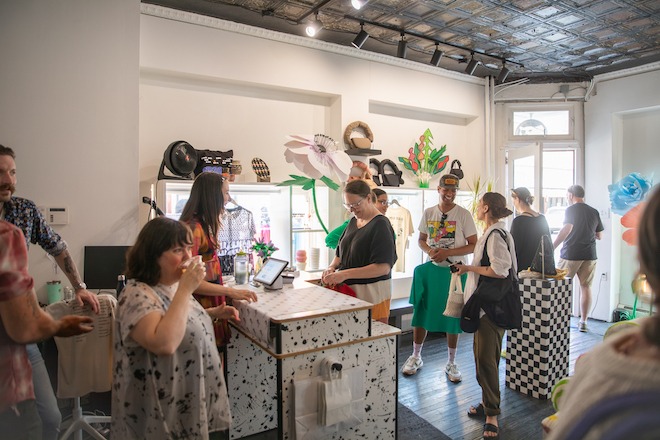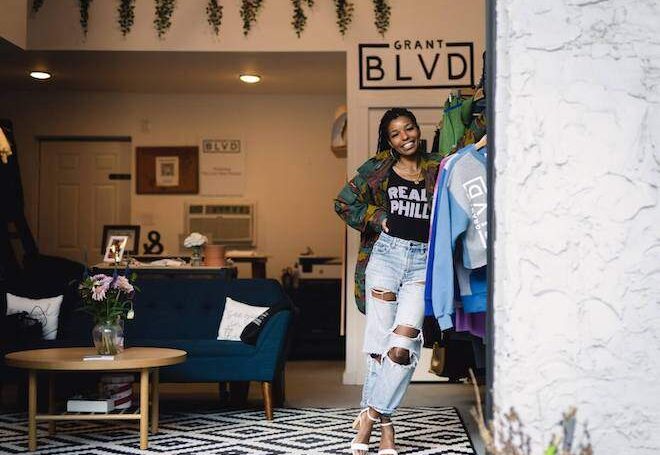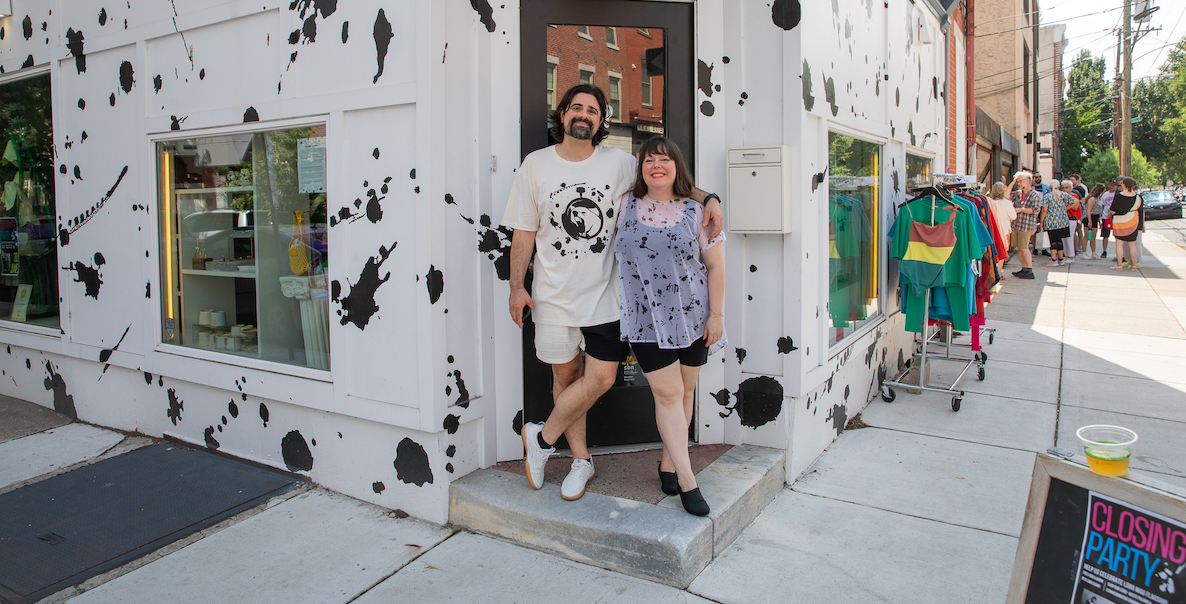When Dr. Kimberly McGlonn talks about the decision to close Grant Blvd’s physical location, she speaks in metaphors about regeneration. “I had to go through a decomposition in ways to become fertilizer for a much richer, a much richer story,” she says.
Metaphors come naturally to McGlonn. She was a high school English teacher for nearly 20 years before founding her sustainable, Beyoncé-backed clothing line and boutique. “Poetry was actually my first art,” she says. In this case, the metaphor encompasses what she hopes for the future. The physical shop on 34th Street is closing so Grant Blvd can evolve; the past providing nourishment for the future.
Even with that outlook, the closing party on June 22 “felt like a wake,” she says. A week later, Lobo Mau, another Philly-based, sustainable clothing line, held its closing party for its store on 6th and Bainbridge.
Both closed their retail spaces amid relative financial success. Lobo Mau had its best sales year to-date in 2023; revenue grew by 20 percent. McGlonn declined to share sales figures, but said Zenith Wealth Partners valued Grant Blvd at $3 million as part of an investment round she’s raising this year.
Nonetheless, McGlonn and Jordan and Nicole Haddad, the siblings and co-owners of Lobo Mau, maintain that continuing their brick-and-mortar operations wasn’t feasible anymore.
Neither business is going away; both Grant Blvd and Lobo Mau are refocusing on production, online sales, workforce training and other mission-driven projects. But their closures underscore the difficulty of running a brick-and-mortar, sustainable business in Philly — and it’s only getting more difficult now that City tax benefits that helped them thrive have ended.

Covid’s lingering effect on businesses
Four years later, it might feel odd to think of Grant Blvd and Lobo Mau’s closures as Covid casualties — they survived the countless shutterings in 2020 and 2021. Despite the resurgence of in-person concerts, theater, community gatherings and even in-person work, consumers are still buying online more than they did in 2019.
“I definitely feel like the shopping patterns have changed,” says Nicole Haddad. “Every business owner that I’ve talked to has said the same thing.”
Nationally, nearly 3,200 brick-and-mortar stores have closed their doors so far in 2024, for reasons varying from reduced foot traffic to increased rents to the knock-on effects of inflation. Malls and shopping corridors are still dealing with vacancies. Two thirds of small businesses close within the first two years.
Devi Ramkissoon, executive director of the Sustainable Business Network of Greater Philadelphia (SBN), says they’ve seen a lot of storefront-based members struggle to get customers through their doors. Since 2022, SBN has held neighborhood tours in Fishtown and East Passyunk to increase awareness and create foot traffic to shops like Modest Transitions, Monarch Yoga and Fishtown Seafood, and Good Buy Supply and River Twice. “We brought consumers literally to the doorsteps of businesses,” Ramkissoon says.
“I really don’t think sustainability is a choice anymore.” — Devi Ramkissoon, Sustainable Business Network
Last year, the organization’s board started an informal support group where retailer members discuss ongoing challenges. They’re in the early stages of formalizing it and opening it up to other SBN members.
Beyond lack of foot traffic, Grant Blvd and Lobo Mau continue to contend with lower-priced, faster fashion competition. Lobo Mau is known for using deadstock fabrics and screen-printing for its line, including its signature black-and-white shirts and pants made from sweatpant-like material that would fit right into the wardrobe of David Rose (played by Daniel Levy) in Schitt’s Creek. They recently put out a mesh summer line full of bright greens and purples. Grant Blvd favors denim and colorful shirts and dresses made of natural fibers and deadstock fabrics alongside t-shirts with pithy, activist slogans.
Sustainable slow fashion might come with better quality and a feel-good vibe, but it often also comes with higher price tags. Grant Blvd’s prices range from $30 for t-shirts to more than $300 for outerwear. Lobo Mau’s range from $58 for a t-shirt to around $300 for a dress, skirt or jacket.
“We are offering a story of craft, we’re offering a story of intentionality, and that’s not aligned with a disposable price point,” McGlonn says.
On the frontlines of Philly’s streets
What’s more, Philly isn’t making it easy for brick-and-mortars to survive. Our much-maligned city street and sidewalk closures can make it difficult for shoppers to access businesses they need to go to. Everyday, dozens of sidewalks are closed for Streets Department improvements and residential building, sometimes for months at a time. Wandering through neighborhoods window shopping may not be worth the extra effort.
“There’s a lot of … positive action in the form of building development, but there also is a lot of street access issues that are created,” says Arun Prabhakaran, president of the Urban Affairs Coalition, a civic advocacy and community engagement nonprofit that has worked to support Philly’s community corridors. “Boutiques like Lobo Mau mile and Grant Blvd really do need ongoing support from a range of stakeholders, even when they’re successful, to maintain and drive retail presence.”

Lobo Mau experienced the effect construction can have on foot traffic in 2021, when a water main burst right in front of their business. During nine months of construction, Jordan walked by a giant hole in the street filled with hoagie rolls and Yuengling cans. It was “the most Philly thing I’ve ever seen,” he says. At one point, customers had to cross a plank to get to their doors. The vibe was more rowdy pirate ship than pret-a-porter. The Haddads started leaving the city for direct-to-consumer shows.
“[The street] wasn’t just closed. [There was] jackhammering and dust,” Nicole says. “We did have customers coming in, but it wasn’t the foot traffic that we needed to sustain a business.”
To make matters worse, brick-and-mortar retailers often bear witness to Philly’s homelessness, mental health and addiction crises, enduring more than just run-of-the-mill crime — Lobo Mau had a break-in; Grant Blvd dealt with vandalism. More than once, McGlonn called the police when folks came in who needed more mental health support than her staff could give. The Haddads say the issues Lobo Mau faced weren’t pervasive, but for McGlonn, it felt like one of several signs to shutter the shop.
“That was taxing on my staff to be … on the frontline of that public mental health crisis and that public crisis of what it means to be unhoused,” McGlonn says.
It’s tough to run a small, sustainable business in Philly
If all of the above weren’t difficult enough, Grant Blvd and Lobo Mau were operating as sustainable businesses — which comes with additional challenges. Within SBN’s membership, Kitchen Garden Textiles, Earth Bread + Brew and Birchtree Catering closed down within the last two years. In 2023, United by Blue closed its flagship location in Old City and at Penn as it struggled with finances in 2020 and 2021.
“We are having to work harder to meet the needs of our team and our business, and just keep the lights on,” says Tess Hart, co-founder and CEO of Callowhill’s Triple Bottom Brewing, a company that believes taking care of people and the planet is equally as important as profitability. Hart and McGlonn both opened their businesses in 2020 and bonded over similar values — namely, sustainability and fair chance hiring practices — and the struggles of being a small business owner trying to do good in the city. “It feels so sad to close a business, to see a business close and I have many friends who have had to make that choice in recent years.”
Cost is a major issue. Sustainably made and sourced fabrics are more expensive than cheaply made wares are. So are paying employees a living wage (Grant Blvd’s wages start at $15 an hour) and manufacturing clothes in America. Grant Blvd makes its clothes in its Kensington studios; Lobo Mau works with factories in the Philadelphia area. Business Insider reports that it costs around $25 more to manufacture jeans in the U.S. compared to countries like Vietnam or Bangladesh.
As a result, Ramkissoon says, sustainable businesses “often have to look at other forms of financing in order to be able to maintain them,” even though more businesses will need to embrace these models if we’re ever going to make progress on climate goals.
“I really don’t think sustainability is a choice anymore,” Ramkissoon says. “I think that all businesses have to, in some way, shape or form, adhere to more sustainable practices if we’re ever going to make any realistic or any meaningful changes when it comes to addressing the social inequity, when it comes to addressing inequitable economic growth, when it comes to addressing climate change or any of the other environmental issues that we’re seeing.”
“We are offering a story of craft, we’re offering a story of intentionality, and that’s not aligned with a disposable price point.” — Kimberly McGlonn, Grant Blvd
Last year, the City gave Grant Blvd and its partner the Skills Initiative, a West Philly-based workforce training and development program, a $250,000 grant to launch its Fashion the Future Forward initiative, which prepares justice-impacted people for careers in fashion and design — what McGlonn set out to do in the first place. In 2022, she received a $10,000 grant from Beyoncé’s BeyGood foundation. She’s also been fundraising for the business — trying to raise half a million this year to help support operations, but is quick to note Black women, like herself, receive only around 0.39 percent of venture capital funding. She has since moved into a larger studio in Kensington and is in the process of growing her team.
As one of the City’s zero waste partners, Lobo Mau was able to access Philly’s Sustainable Business Tax Credit, which, before it ended in 2022, provided businesses with up to $4,000 in benefits. Although the program has ended, Jordan and Nicole are keeping up with the practices because it’s part of their mission.
The irony of the City not re-upping a program like this — under a mayor who campaigned on a “clean and green” slogan and recently joined Climate Mayors — is not lost on Jordan. “Are we greenwashing in public office too?” he says.
For Lobo Mau, the final decision to close came down to money. Their landlord sold their building and the new landlord tripled the rent. “The rent was just the nail in the coffin,” Jordan says.
McGlonn says rent hikes didn’t play a role in Grant Blvd’s closure. The University of Pennsylvania was a great partner, sensitive to the challenges she faced as a Black business owner on a predominantly White campus. Instead, she regarded the closure of Urban Outfitters on Penn’s campus as a portent of what her future held.
“If Urban can’t survive here, why would we be different?” she says. “These are multinational, international companies with large marketing dollars.”
Losing these shops is a blow for Philly’s slow fashion and sustainability communities. “It was really lovely that they had physical locations that we could point to, because oftentimes sustainability can feel like an academic concept,” Ramkissoon says.
“It’s harder to showcase an engineering firm or an architectural firm that upholds sustainable practices. We can certainly talk about them, and there are certainly amazing firms in our region that do great work that is truly sustainable. We can point to examples of buildings they’ve done, or larger projects that they’ve done. But there is something different about having a brick and mortar where people can go in and touch and feel and experience for themselves.”
The future is slow, sustainable fashion
Grant Blvd and Lobo Mau aren’t going away; both are maintaining smaller retail presences: McGlonn through Blk Ivy, her vintage shop at 36th and Lancaster, and Lobo Mau with the Bok Building studio they share with sustainable rug company Tuft the World. Lobo Mau plans to open the studio for shopping (as it did before they moved to Bella Vista), fashion industry panel discussions and classes on silk-screening and rug-tufting. The Haddads teach at Drexel and offer paid, $15 per hours internships to their students, so offering classes seemed like a natural extension. (McGlonn also teaches at Drexel).
“We were faced with a decision when we decided to close the Bainbridge location: Do we just pivot to being an online-only business? Forty to 50 percent of our sales are coming in through e-commerce, but that would crush my soul,” Jordan says. “Wherever we are, we will continue to bring people in.”
Grant Blvd is making changes, too. During the pandemic, McGlonn’s values shifted. She became less interested in making clothes women could wear to work — a place where they face harassment, mental exhaustion and unequal pay — and more interested in how people care for themselves at home, the place they prepare to face the world. She’s in good company. Luxury labels Louis Vuitton, Gucci and Hermès are venturing into the homewares space, as the furnishings market is growing more quickly than fashion. It’s expected to balloon from $730 billion to more than a trillion by next year.
Walking through Grant Blvd’s new studios in the Maken building, passing sewing mannequins and drafting tables, she points out her vision for the brand’s future: Georgia O’Keefe inspired tablescapes and homewares, art made from fabric scraps, bespoke loungewear in dreamy pastels. It’s a shelter concept with a digital component of curated content drawn from both McGlonn’s experiences traveling to more than 30 countries and as a classroom teacher.
“Forty to 50 percent of our sales are coming in through e-commerce, but that would crush my soul. Wherever we are, we will continue to bring people in.” — Jordan Haddad, Lobo Mau
“The goal for the company moving forward is not to prepare people for work, which so many of us don’t feel excited about, but instead to prepare us to survive and to thrive within our home spaces and our lives,” she says. “[I’m] really inspired by how we create these quiet moments of remembrance of the natural world, and to activate a sense of romanticism about the natural world in ways that are artful and accessible and personal. How do we do that in ways that are going to invite [people to] the dinner party versus the dinner reservation?”
Of course, activism will remain essential to the brand’s mission. McGlonn is excited to be in Kensington’s Maken Building, owned by fellow B-Corp and socially conscious developer Shift Capital. She’s intentionally moving closer to where people are struggling with addiction. In August, she’ll launch another cohort of the Fashion the Future Forward program with the Skills Initiative. They wrapped up the application period this month and are hoping to select 10 justice-impacted people to participate.
“We’re really eager to take the lessons that we learned, build on the successes that we had, respond to the challenges that came in front of us and really keep the project moving forward,” says Cait Garozzo, executive director of the Skills Initiative.
Still, folks will miss their brick-and-mortar shops. Carly Mayer is a metalsmith, jewelry designer and co-owner of Forge and Finish, a brand Lobo Mau stocked in their store. As we talk on the phone, she walks through her closet, describing her favorite items from Lobo Mau and Grant Blvd. She went to Lobo Mau’s closing party and loved listening to Jordan and Nicole’s parents, Brazilian jazz musicians perform. It always felt like a family-friendly place, she says.
“My son … feels comfortable in that space. He knows Nicole and Jordan, because he grew up basically with them,” she says. “It’s not just buying a product, you begin to have relationships and friendships with Nicole and Jordan.”
![]() MORE ON SMALL BUSINESS IN PHILLY
MORE ON SMALL BUSINESS IN PHILLY




